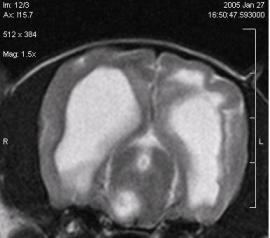Researchers at the University of Georgia Search for Causes of Meningoencephalitis
Meningoencephalitis, a general term for inflammation of the brain and its outer covering (meninges), is a naturally occurring disease that is relatively common in toy breed dogs. The most common breeds affected include the Maltese Terrier, Pug, Yorkshire Terrier, Chihuahua, Pomeranian, Pekingese, Shih-Tzu, Poodle. Clinical signs associated with meningoencephalitis may include lethargy, behavior changes, loss of balance or coordination, walking in circles, disorientation, visual deficits, seizure activity and commonly the disease is fatal. Meningoencephalitis typically is diagnosed by MRI brain scans and cerebrospinal fluid (CSF) analysis.
The causes for meningoencephalitis in toy breed dogs are likely to be multifactorial. Genetic predispositions, infectious agents, and inappropriate immune responses are all thought to play important roles. Unfortunately, the definitive causes for most cases of canine meningoencephalitis are identified only rarely. Currently, non-specific anti-inflammatory drugs including prednisone and other chemotherapeutics are used to control the progression of the disease. This approach seldom is curative and dogs that do survive require life-long therapy to keep the brain inflammation in remission.
Many of the meningoencephalitis cases of “unknown cause” are suspected to have an infectious organism as a precipitating factor. In human meningoencephalitis, a test called the polymerase chain reaction (PCR) has been successful in identifying the presence of many specific, infectious causes for meningoencephalitis and this has dramatically improved survival rates in people. An infectious organism has been identified in approximately 75% of human meningoencephalitis cases and directed antimicrobial therapies often are curative, in marked contrast to the current situation in dogs.
At the University of Georgia, College of Veterinary Medicine, a neurology research group lead by Scott Schatzberg, DVM, PhD, DACVIM (Neurology) is working to identify potential infectious causes for canine meningoencephalitis.
If causative infectious organisms are identified this should allow for new targeted antimicrobial therapies, ultimately leading to improved survival rates in dogs with brain inflammation. The identification of infectious causes for toy breed meningoencephalitis would revolutionize the way veterinary neurologists diagnose and treat this challenging condition.

Related Articles
Help Future Generations of Dogs
Participate in canine health research by providing samples or by enrolling in a clinical trial. Samples are needed from healthy dogs and dogs affected by specific diseases.



